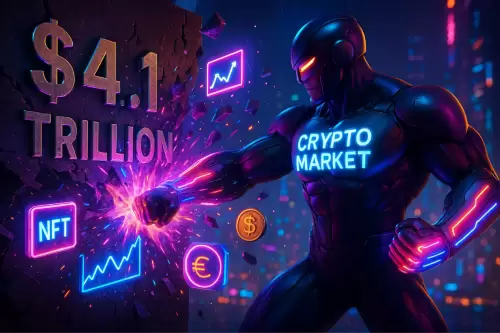 |
|
 |
|
 |
|
 |
|
 |
|
 |
|
 |
|
 |
|
 |
|
 |
|
 |
|
 |
|
 |
|
 |
|
 |
|
Cryptocurrency News Articles
Senate leader John Thune has filed for a procedural vote (cloture) on the stablecoin Genius Act
May 16, 2025 at 11:47 pm
Yesterday Punchbowl News reported that Senate leader John Thune had filed for a procedural vote (cloture) on the stablecoin Genius Act
Senator Elizabeth Warren (D-MA) has raised concerns about the latest draft of the stablecoin bill, the Genius Act, in a memo to colleagues.
The bill, which is being spearheaded by Sen. Cynthia Gillibrand (D-NY), has already secured support from several Democrats. However, it faces opposition from Republicans, who prefer a broader digital asset bill.
One issue that has been raised is the involvement of President Trump’s sons in crypto firm World Liberty Financial, which some view as controversial.
The firm’s new stablecoin, USD1, was used in a $2 billion transaction by a firm chaired by the UAE’s national security adviser.
Earlier this week, Sen. Gillibrand implied that family members are legally permitted to issue stablecoins, but officials themselves cannot.
Since early May, there has been a Genius Act clause that states: “For the avoidance of doubt, existing Office of Government Ethics laws and the ethics rules of the Senate and the House of Representatives prohibit any member of Congress or senior executive branch official from issuing a payment stablecoin during their time in public service.”
Sen. Warren also expressed concern that the bill does not prevent BigTech firms such as Meta or X from issuing stablecoins.
The latest draft does have a clause addressing issuance by public non-financial corporations, which will be approved by the Stablecoin Certification Review Committee based on financial stability concerns, protection of consumer data, and avoiding tying stablecoin services to other business activities.
However, this only applies to public companies, not unlisted unicorns such as X, Stripe, or others. The Stablecoin Certification Review Committee consists of the Secretary of the Treasury, the Federal Reserve Chair or Vice Chair, and the Chair of the Federal Deposit Insurance Corporation (FDIC).
Sen. Warren further noted that the bill’s new language imposing restrictions on when foreign companies can issue stablecoins in the United States does not make a material difference, given that the coins could still be issued offshore and moved through domestic decentralized exchanges accessed by terrorists and criminals.
Her concern might relate to a change of wording where “any person” was substituted with “digital asset service provider” (DASP) in several places. This was likely to cater for the upcoming crypto market infrastructure legislation.
However, people involved in decentralized exchanges would be covered by “any person” but likely not by references to DASPs. So, this may be the loophole she is concerned about.
Sen. Warren concluded by observing that stablecoins offer many potential benefits for society, but they also carry significant financial stability risks which she feels aren’t sufficiently addressed in the latest draft.
She wrote that it “would still allow issuers to actually invest their reserves in riskier assets, hold them in offshore accounts, engage in dangerous financial and commercial activities, and prevent regulators from applying strong safeguards – inviting a future crash and costly bailouts.”
We’d observe that most other jurisdictions have insisted that reserves of locally issued stablecoins are held onshore, so the Genius Act is different in that respect. Some have argued that investments should only be allowed directly in government securities, rather than money market funds that invest in government securities, which add a layer of risk.
However, there’s a desire to support investment of stablecoin reserves in tokenized assets, which are often tokenized money market funds. Potentially, there could be some guidelines on acceptable tokenization standards. For example, this might include safeguards regarding who provides custody for tokenized assets, audits, and preventing tokenization firms lending out the underlying assets. There’s no point in banning stablecoin issuers from lending out reserves, if the tokenization firm can do the same.
Despite these detailed concerns, it’s worth noting the broader political landscape. Sen. Warren has consistently maintained firm opposition to cryptocurrencies and stablecoins, making her support for any such legislation unlikely. The key to passing effective regulation lies instead in gathering sufficient Democratic support from lawmakers who share Sen. Gillibrand’s recognition that stablecoin legislation is necessary. Given that stablecoins already exist, the current regulatory vacuum only magnifies their potential risks rather than addressing them.
Disclaimer:info@kdj.com
The information provided is not trading advice. kdj.com does not assume any responsibility for any investments made based on the information provided in this article. Cryptocurrencies are highly volatile and it is highly recommended that you invest with caution after thorough research!
If you believe that the content used on this website infringes your copyright, please contact us immediately (info@kdj.com) and we will delete it promptly.






























































